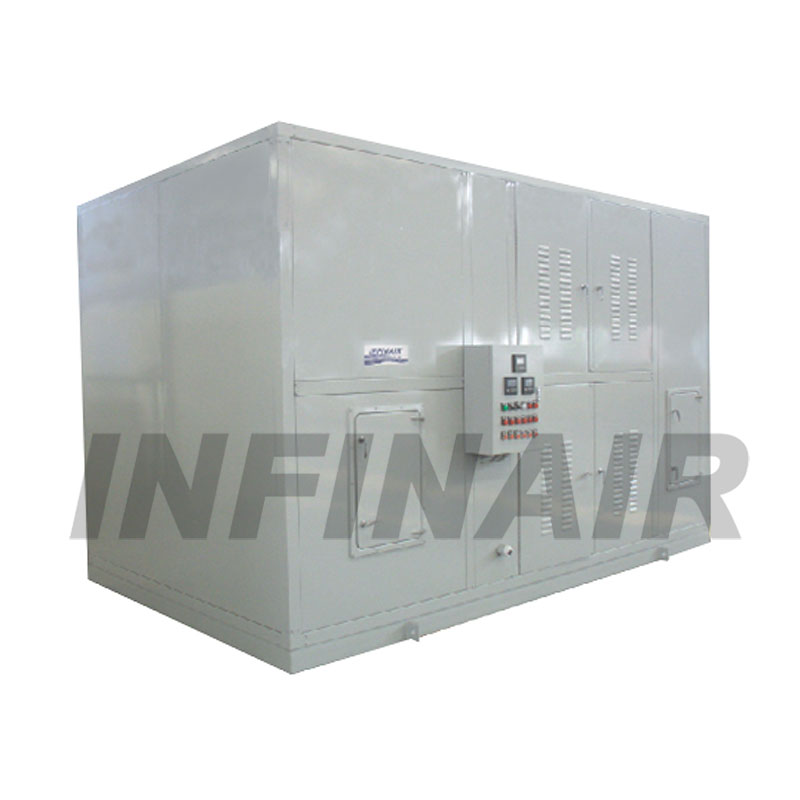
Section 1: Housing
Structure:
The housing of the unit should use a section steel frame. It should be assembled at the factory when the transportation conditions permit. The strength of the housing structure should meet the requirements of European EN1886:1998 standard 2A. The design of the housing is to prevent thermal bridges, and the thermal break ratio should be over 0.7.
Material
The housing material is 25mm ([option]: 50mm) thick insulation panel, with the outer layer of 1mm cold-rolled steel plate, and the inner side of 0.7mm galvanized steel plate. For 50mm thick insulation panel, the outer layer is 1.5mm cold-rolled steel plate and inner side is 1mm galvanized steel plate. The middle is filled with Class A fire retardant insulated fiberglass (option: polyurethane foam). The housing gaps, wrap angles and joints should be sealed. After the insulation layer is finished, it should be ensured that it is not exposed to the airflow. The unit panel and the unit frame are sealed with 5mm gasket, which has good sealing performance and no air leakage.
Access Door
The unit should have an access door that can be easily accessed inside the unit. It shall be made of plastic steel material, and the sealing material shall be installed at the sides, and it shall be fixed with the unit. The access door should have its own sensor. When the access door is opened, the unit should not start.
Surface Treatment
The surface should be first treated with anti-rust primer, and then with epoxy paint to ensure that the unit is corrosion-free ten years operating outside. The appearance color is determined by the color code provided by the customer, and INFINAIR provides grayish white by default. There should be no sags, bumps and so on.
Options: Rain Cover and Rain Hood
The inlet should be mounted with a 45-degree rain cover. The rain cover material should be steel panel. The surface should be treated with anti-rust primer first, and then painted. It is guaranteed that rainwater cannot enter the unit regardless of the direction and strength of the wind. The air inlet should be equipped with a safety guard to prevent foreign bodies from entering the unit. The rain hood should have a certain slope, and the joints should be overlapped to quickly remove rainwater and snow. The hood should be resistant to certain wind levels.
Section 2: Burner
Burner Type
The burner should be of direct combustion type, and the burning capacity should be adjusted within the range of 0 to 100% of the total heating capacity. The burner manifold should be made of cast iron with a V-shaped perforated stainless steel panel. The burners should be connected in parallel to meet the heating requirements. The burner should be equipped with a bypass damper to regulate the air speed according to the actual operating conditions. The flame must cover the entire length of the burner at any time during system operation. The combustion produces a maximum CO content of no more than 5 PPM (parts per million) and a nitrogen oxide content of no more than 0.5 PPM, which meets US and European national standards.
Burner Structure
The burner should consist of two parts: the ignition system and the main combustion system.
Electrical Control Cabinet
The side of the burner should be equipped with a control cabinet with factory tested control circuit inside. The control cabinet shall include a flame sensor, a high temperature protector, a reset switch, an air differential pressure switch, a burner control relay, and an ignition controller, and provide safety monitoring functions. They should be installed, wired, and tested at the factory.
[Option]: Remote Electrical Control Cabinet
The unit for outdoor installation can be equipped with a remote control cabinet for easy control of the unit. It should include: three-in-one switch, reset button, power switch, dirty filter indicator, manual reset indicator, fan operation indicator, ignition indicator, manual temperature regulator.
Section 3: Fan section
It should use a DWDI centrifugal fan. The wheel cone should be closely matched with the inlet cone. A vibration isolator should be installed where the fan is connected to the unit.
Fan bearings shall be supported by cast iron pedestal and can be lubricated with a L-10 life in excess of 80000 hours.
The motor should be a 380V, 3-phase and 50Hz motor. It is a squirrel cage induction motor type of a standard size. The motor shall have a degree of protection standard IP54, an insulation class F and Temperature Rise Class B. It must be equipped with an adjustable base to adjust the belt tension on the site. The rated power of the motor should be more than 120% of the actual shaft power of the fan wheel to ensure safe and reliable operation of the unit when the unit system pressure changes.
The drive unit should adopt V-belt and the belt should use the heat-resistant type of SPA, SPB or SPZ models. The pulley should have a taper bore bushing and set screws for quick installation and removal. The drive unit should be at least 150% of the driving power of the fan.
Section 4: Filter section
The primary filtration of the unit should adopt standard type multi-pleated panel filter. The filter should be made of non-woven material. The G4 grade filter has an efficiency of 25%~30%.
[Options]: The medium efficiency filter of the unit should adopt bag air filter with filter grade of F5~F9 and efficiency of 40%-95%.
The filters above should be installed inside the unit with supports and ensure proper strength. They shall be replaced on the front or sides.
Thank you for visiting INFINAIR CORPORATION’s website. Please share your information below and we will gladly respond to your request.